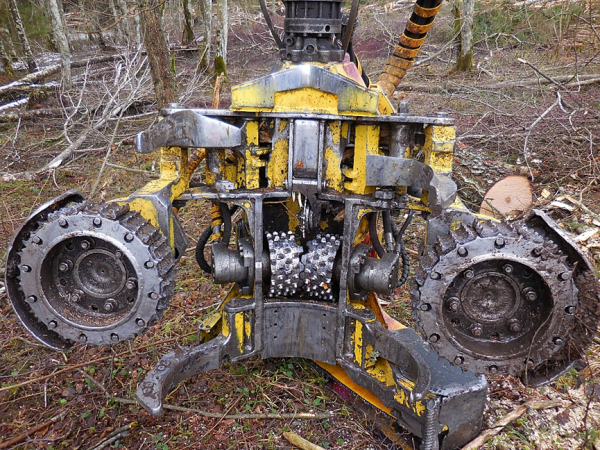
Exploring the Options of Log Quality Improvement in Logging Work
In order to improve the quality of timber production, JSC “Latvia's State Forests” (LVM), in cooperation with the Forest Research Institute “Silava”, has conducted a study on the depth of imprints of different types of harvester rolls in the prepared logs and on the impact of these rollers on work efficiency.
It compares the widely used steel outer rollers with 14 mm studs or standard rollers, with Moipu Flex Standard (Moipu) outer rollers with movable adhesive plates with a rubber base. Summarizing the results, it was concluded that in final felling 75% of all roller stud imprints with Moipu rollers are up to 5 mm thick, but with standard rollers - up to 7 mm deep. In turn, in thinning areas these rates are 7 mm and 8 mm, respectively. This shows that when working with Moipu rollers we can reduce the depth of the stud imprints in logs. Shallower stud imprints result in less negative impact on the quality of lumber and other logs. However, it is still a matter of the inner rollers of the harvester head that is similar to standard steel rollers. In 26% of cases the internal roller imprints were deeper than Moipu and in 13% of cases - than those of standard external rollers. This reduces the positive impact of Moipu rollers on the final product and indicates the direction of action for new roller design engineers that require new improvements.
In addition to the depth of the imprints, the study also focused on the impact of rollers on work efficiency and cost. The purchase price of Moipu rollers compared to standard rollers is higher and lifetime - shorter. This increases costs by 0.01 EUR/m³ in final felling. However, Moipu rollers have better trunk adhesion, resulting in a 1% increase in engine productivity and a 2.6% reduction in fuel consumption per m3 of wood compared to standard rollers, reducing the cost of wood produced by EUR 0.06 per m3. Thus, the total cost reduction for Moipu rollers is EUR 0.05 per m3.
This study has shown that when working with Moipu rollers, we create shallower imprints in logs and can cut the average cost of wood preparation by 0.5%. However, there is still a challenge for engineers to develop a softer design of internal feed rollers. For practitioners, however, the most important task is to regularly check and adjust the hydraulic pressure on the rollers to comply with the harvester manufacturer's instructions and not to cause excessive imprints when working with both Moipu and standard rollers. This will have less of a negative impact on the quality of the products produced by further processing of logs.


